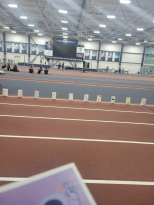Shoe repairman continues family tradition
The shop housed in the yellow brick building at 210 S. Allen Street in State College has not changed much over the past half-century. The walls are still covered in the same wood paneling, the floors with the same green and white linoleum tile. The workbench at the very center of the back half of the shop is the very same the shop was christened with -- stained over 37 years with the same shoe polish and glue that coats the hands of Angelo Card, 41, the proprietor and sole employee of Custom Shoe Repair.
“Cobbler… shoe repairman… some guys in the industry really care what they’re called,” Card muses. “Me? I don’t give a damn.”
Card’s late grandfather, also named Angelo Card, started the business, which used to be located in the basement of the Corner Room back in 1966. “I think my grandfather always wanted me to take over his shop,” Card admits.
It was an unspoken understanding between the men, who worked together from the time young Angelo began shining shoes when he was seven. By the time he was 14, Card could do anything in the shop.
Penn State is a community of traditions, and the Card family presents no exception.
“The career chooses you”
In 1974, Card’s grandfather moved Custom Shoe Repair up the street to its current location. Card remembers working beside his grandfather for long hours, unknowingly learning a skill that would come to define the rest of his career. “I didn’t really give [working here] much thought when I was real young,” he says. “But when I got older it just kind of fit.”
“You know how sometimes careers just choose you? I couldn’t imagine doing anything else.”
Card has lived in State College for as long as he can remember, and is very content to continue doing so. Sure, after graduating from State High he traveled around the country to places like Long Island to learn special crafting techniques, and out West to study under other artisans like Randy Merrell (whose line was purchased by Wolverine Worldwide corporation).
But he always came back to State College. “To be honest, if I never left Centre County I would be happy,” he says. “The things I find important in life, I can find right here.”
Both Card’s late father, Leonard, and younger brother, Lee, also opened Custom Shoe Repair shops, having studied the craft from a young age. But even when they moved to Harrisburg in 1983 to open their own shop, Card stayed behind with his grandparents.
“It worked out for everyone,” Card says. “Lee likes the city life, I like the small town. I bought my grandfather’s shop, and when my father died [young and of a heart attack], Lee bought his.”
A Changing Industry
Card deftly shapes the oversized piece of rubber glued to the heel of a sleek black boot with a worn carving knife. “The work was easier and faster [when I started],” he remembers, whisking the excess rubber into a bin beside him in the same swift, clean move. “There wasn’t necessarily more. When I was young, I had one pot of glue and that was it! Now it’s all this synthetic polyurethane instead of rubber and wood.”
The machinery has changed a lot over the years as well, to accommodate these new shoes. “I update when I need to…” Card begins, but stops short, running a polish-stained hand through dark, short-cropped hair.
He turns and steps easily across the two feet of space between his workbench and a hulking device that spans the entire length of the left wall of the shop, his perfectly shined black Oxford shoes a stark contrast to the grimy old tiles underneath them.
“But, for example, this machine…” He gestures to the whirring 10-by-three-foot piece of machinery. “This machine I rebuilt instead.”
The gargantuan apparatus is similar in shape and size to a sideways laying furnace, and spins twenty different polishing brushes, buffers and sanders with varying grains. This is where the magic happens.
“You don’t usually replace a machine like this, once you have a feel for it,” Card says.
“I don’t have to look [while I work].” He drops his greasy right hand solidly on the side of the machine, like a coach would pat the shoulder of his star player. “It’s just… a rhythm.”
Machines have also become much smaller since he and his grandfather worked side-by-side all those years ago. Of course this doesn’t make any logical sense to Card, who points out that with a shrinking machine comes less room for wheels, which, for the repairmen, means paying more money for less capabilities.
The shop, itself, hasn’t changed nearly as much as the shoes or the machinery, except for a couple of minor details. Card stands under what appears to be the rough edges of a cut partition that once separated the front and back halves of his grandfather’s shop. According to him, these are the remains of what used to be a wall with a door and one tiny window.
He smirks crookedly, revisiting this humorous memory. “After a while the wall got old,” he says mischievously. Slapping his hands on the grease-stained front of his long blue apron, he steps back to admire his old handiwork. “So one day I took a buzz saw to it! And that was the end of that.”
Tradition
An older woman walks through the front door clutching a pair of old sensible navy shoes, followed by Card’s eldest daughter, Tiffany, who hurries behind the counter to hug her father.
The woman smiles at Card, and glances to her right at a massive leather shoe-shining chair. “That’s new,” Arlene Thompson of State College exclaims. “And cute!”
“We found it at a fair,” Card replies leaning forward enthusiastically. “It had stood in the old [owner’s] shop since 1919, and when we all lifted it up to stick it in our truck, old coins from back then started falling out of it!” They laughed together as Card painted the scene of a suddenly chaotic pile of about twenty people diving for antique coins under the heavy chair balancing precariously in the arms of four middle-aged men.
“I’ve been coming here for years,” she says, “since your grandfather owned the shop.” Card nods.
“I like [your] family,” she explains. “[You’re] all hard workers.”
“My dad’s very hard-working,” Tiffany reaffirms, smiling next to her father. “And he tells it like it is. He’s a lot like his grandfather that way.”
Card looks away, attempting to downplay the compliments. “Just comes with the territory,” he mumbles shrugging, and shuffles back to the workroom.
“Shoe shops used to be like cell phone stores are now,” Card reminisces. “They were everywhere! Always in your face, and you didn’t even have to think about it. Now you have to advertise.”
The survivor
When Card first took over ownership of the shop, there were about five other cobblers in the area.
But the cobbler shops slowly dwindled, “running their own businesses into the ground” due to what Card refers to as “shoddy work” compared to his own family’s. “We always believed in quality. We don’t make as much profit, but we get a lot more business [from returning customers].”
In fact, Card has been known to turn away potential customers if he can see that they will be putting in more money than is worth putting in.
“There’s [also] a fine line between drumming up enough business to earn enough to raise a family, and still being able to have a life,” he says.
Card smiles, recounting how in recent years he has cut back a lot on the hours he spends working in the shop in order to be able to watch his four daughters, now ages one, three, 18 and 21, grow up. “When my oldest two were young, I was hardly around,” he says, glancing up at the photos tacked above his work area. “I used to be open six days a week, and work seven. But I’ve realized there’s more to life. Now, I go in at 7:30 and try to leave by 5:30.”
The reason?
Card’s favorite past time. “‘Park tours’ with my youngest,” he says, examining his shiny Oxfords shyly. “We like to play on the swing sets.”
A bright-eyed young blonde smiles broadly at the pair of newly-repaired gold dress heels Card pulls out of a brown paper bag with her name on it, which he has just retrieved from the cubbies.
“I’ve gotten, like, three to four pairs of shoes done here so far,” Samantha Culovic says, excitedly examining the rubber soles Card had installed with her manicured hands. “It’s well worth the investment.”
“I’m getting married in two weeks,” she says, her eyes shining from the new shoes, to Card, to the floor. “So Angelo suggested rubber soles so that I don’t slip – which is, like, my worst nightmare!”
Culovic thanks Card profusely and opens the front door to exit onto Allen Street. She pauses and glances back at Card, still beaming. “I’ll be thinkin’ of you while I’m walkin’ down that isle!” she says laughing, and Card laughs along.
Tradition Not for Sale
Card dabs cement thinner on his fingers, then winces as the chemical stings a recent burn he received from the sander he has just turned off. He rubs his hands together to wash off a stubborn layer of shoe polish and glue, eying the small white clock on the back wall.
“There won’t be many of these shops around in the future, I can tell you that,” Card says, replacing his gold wedding band and simple silver watch. “You could drive two hours in any direction from here, and you’ll probably find about three old guys who own cobbler shops – all who are probably gonna retire very soon.”
All who, Card insists, will subsequently close down their shops.
“Once it’s done, it’s done,” he insists. “Sometimes something becomes a part of you – you spend your whole life building a reputation – and it would destroy you inside (he presses his left palm to his heart) to see someone else destroy that.”
The legacy, for Card, cannot be bought. This family takes pride in a tradition of quality work, of hard work, of happiness in work. “I like what I do,” Card says simply. “And I think that’s pretty powerful. Some guys hate their jobs, but I make a living doing something I like.”
Now that the melody of the machine has subsided, Card becomes quiet. Hands in the pockets of his khakis, he shuffles to the workbench that has stood in this same place since his grandfather installed it. The caked and cracked floor tiles are missing in the space where Card stands. One can see where the exposed concrete was once ridged, but this area is as smooth as glass from 37 years of buffing.
Card glides through his family’s legacy, checking the machines and arranging shoes for the next day, extinguishes the lights and locks the back door of 210 S. Allen St., just like the two Cards before him.
(This story was written for Comm 462.)







